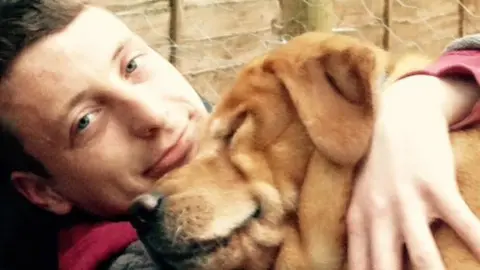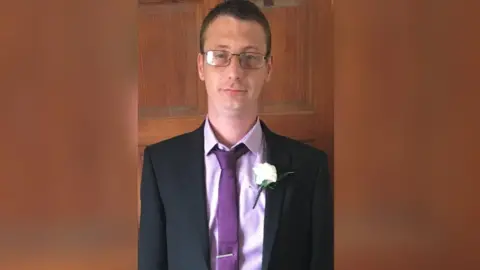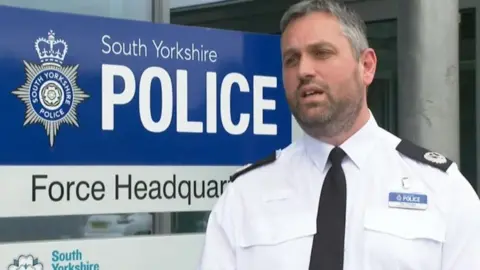Grieving man's concern over 999 mental health call changes
 Family handout
Family handoutA man has voiced concerns about how police respond to mental health calls after his former partner's death.
Mark Giles said he was eventually told officers no longer carried out welfare checks after calling police, worried about his ex Ricki Gillatt.
Mr Gillatt, 36, was found dead at his Barnsley home nearly five hours later. It was unclear when he had died.
The 999 change is part of a new policy to ensure the most suitable agency responds to incidents, police said.
 Family handout
Family handoutSouth Yorkshire Police have been trialling the Right Care, Right Person scheme over the last few months.
Mr Giles said he had not been aware of this when he asked the force to check on his former partner in Cudworth on 20 May after becoming worried after not hearing from him.
Mr Giles said he waited more than 80 minutes for South Yorkshire Police to return his call and was then told to ring 111 instead.
"From start to finish, it was nearly five hours from the original call before anybody actually gained entry into the property," Mr Giles told the BBC.
'Scared'
It is not clear how long Mr Gillatt had been dead by the time emergency services entered his home but Mr Giles said such a delay could mean life or death in other cases.
He said: "I can guarantee that somewhere down the line, that five hours is going to affect somebody and somebody is going to die for the fact that this new process is putting so much of a delay on things."
He added: "I'm just scared that people are going to die because they called the wrong number."
The introduction of the Right Care, Right Person scheme aims to reduce demand on officers and could save a million hours of police time every year, according to the government.
South Yorkshire Police's Assistant Chief Constable Dan Thorpe said officers often did not have the skills required for mental health-related incidents.
He said: "Being dealt with by a police officer can potentially have a detrimental impact on vulnerable people, who feel like they are being criminalised because of their mental ill-health.
"Officers have limited training on mental and ill health and have limited powers to intervene with people in their own home."

ACC Thorpe said training had been taking place to make sure call handlers could "confidently make decisions" on which agency would be best placed to respond.
Dr Sarah Hughes, chief executive of mental health charity Mind, called the policy "deeply worrying".She said: "It is simply impossible to take a million hours of support out of the system without replacing it with investment and mental health services are not resourced to step up overnight.
"These changes must be introduced slowly and carefully, so no-one is abandoned without support."

Follow BBC Yorkshire on Facebook, Twitter and Instagram. Send your story ideas to [email protected].
